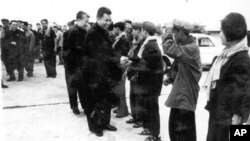PHNOM PENH - Khmer Rouge tribunal Suong Sikoeun took the stand for the last day on Monday, telling the UN-backed court that the regime had been under the absolute control of Pol Pot, whose revolution took place too quickly.
Suong Sikoeun, who rose through the ranks of the communist movement, eventually worked under Ieng Sary, in the ministry of foreign affairs. Ieng Sary is on trial for atrocity crimes alongside former leaders Nuon Chea and Khieu Samphan.
Suong Sikoeun did not testify to crimes of his former boss on Monday. Rather, he said, Pol Pot had the power to manage lower level cadre under Ieng Sary.
In previous testimony, he had said that Ieng Sary was aware that some of his staff members were taken from his ministry, accused of collusion with the CIA or other entities and later taken to the Tuol Sleng torture center for “confession.”
On Monday, however, Suong Sikoeun focused on the role of Pol Pot, who founded the Khmer Rouge movement and died in the jungle in 1998, before the last of the Khmer Rogue soldiers surrendered and folded into the government.
“Pol Pot had absolute power to decide everything,” Suong Sikoeun told the court under questioning from Micheal Karnavas, a defense lawyer for Ieng Sary.
Pol Pot’s plan for a socialist revolution was “too quick,” he said, “and its management depended on an individual, which brought disaster and such mass crimes.”
Suong Sikoeun, who rose through the ranks of the communist movement, eventually worked under Ieng Sary, in the ministry of foreign affairs. Ieng Sary is on trial for atrocity crimes alongside former leaders Nuon Chea and Khieu Samphan.
Suong Sikoeun did not testify to crimes of his former boss on Monday. Rather, he said, Pol Pot had the power to manage lower level cadre under Ieng Sary.
In previous testimony, he had said that Ieng Sary was aware that some of his staff members were taken from his ministry, accused of collusion with the CIA or other entities and later taken to the Tuol Sleng torture center for “confession.”
On Monday, however, Suong Sikoeun focused on the role of Pol Pot, who founded the Khmer Rouge movement and died in the jungle in 1998, before the last of the Khmer Rogue soldiers surrendered and folded into the government.
“Pol Pot had absolute power to decide everything,” Suong Sikoeun told the court under questioning from Micheal Karnavas, a defense lawyer for Ieng Sary.
Pol Pot’s plan for a socialist revolution was “too quick,” he said, “and its management depended on an individual, which brought disaster and such mass crimes.”







